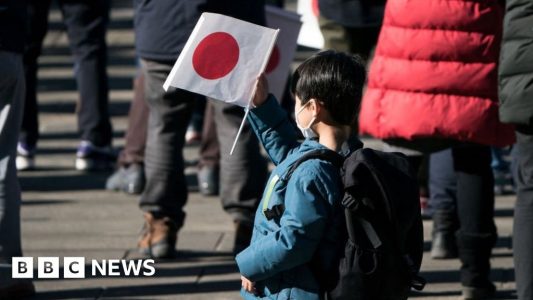Declining birth rate in Japan puts it at risk of collapse - Dispatch Weekly
January 24, 2023 - Reading time: 3 minutes

According to the prime minister of Japan, the nation’s declining birth rate puts it in danger of losing its ability to function as a society.
As Fumio Kishida put it, “It’s now or never.”
Less than 800,000 births are thought to have occurred in Japan, which has a population of 125 million, last year. The number was above two million in the 1970s.
Many nations, including Japan’s neighbours, are seeing a slowdown in birth rates.
But because of the recent increase in life expectancy in Japan, there are now more elderly people than there are professionals to care for them, making the problem more urgent there.
After the tiny state of Monaco, Japan now has the second-highest percentage of individuals aged 65 and older in the world, at roughly 28%.
Mr. Kishida warned lawmakers that Japan was “on the precipice of whether we can continue to function as a society.”
“Paying attention to child-rearing and child-related policies is a matter that must wait and cannot be delayed.”
He stated that he eventually wants the government to increase the amount it spends on initiatives involving children. In April, he added, a new government organisation devoted to the problem would be established.
Governments in Japan have attempted to push similar tactics in the past, but without success.
By the end of the century, analysts predicted that Japan’s population would decline from a high of 128 million in 2017 to less than 53 million. According to official statistics, the population is currently just about 125 million.
Despite these relaxations, Japan has maintained tight immigration policies, but some experts now argue that the restrictions should be further reduced to help Japan address its ageing population.
A number of variables, such as growing living costs, an increase in the number of working and educated women, and easier access to contraception, which encourages women to choose to have fewer children, all contribute to declining birth rates.
China announced its first population decline in 60 years last week.
“Resistance to immigration has not abated”
Dispatch Weekly Focus:
After tiny Monaco, Japan has the oldest population in the entire globe. There are less births being recorded than ever before. It might lose a fifth of its existing population by 2050.
Its opposition to immigration, however, has not changed. In contrast to the UK, where 15% of people are foreign-born, just roughly 3% of people in Japan are. Right-wing movements in Europe and America highlight it as a shining example of ethnic purity and social peace.
But contrary to what those admirers may believe, Japan is not entirely mono-ethnic. The Ainu of Hokkaido, the southern Okinawans, half a million ethnic Koreans, and over a million Chinese are present.
Japan is a wonderful place to start if you want to observe what happens to a nation that rejects immigration as a remedy for declining fertility.
Here, real earnings have not increased in 30 years. Taiwan and South Korea have even surpassed Japan in terms of income.
However, change seems far away. The tight structure that establishes who controls the levers of power is partially to blame.

DW Staff
David Lintott is the Editor-in-Chief, leading our team of talented freelance journalists. He specializes in covering culture, sport, and society. Originally from the decaying seaside town of Eastbourne, he attributes his insightful world-weariness to his roots in this unique setting.




